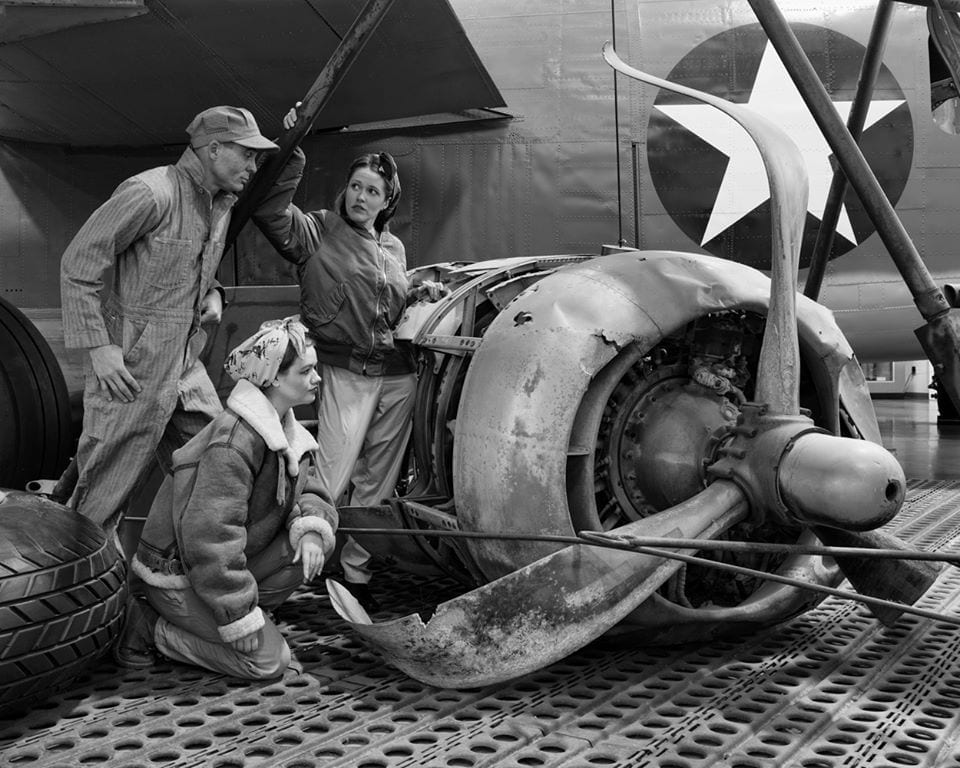SALT LAKE CITY — It’s not difficult to argue that the social upheaval caused by WWII set the U.S. down the path that it continues on today. Sheila Cowley’s play Flying, aims to unravel the immediate impacts of the war in one small town. It’s been months since V-J Day, but Susan is still running the local airstrip and mechanic shop as best she can until her husband and small-town hero, Bob, can return. Though she has more than enough skill and knowledge to run the show, sexism is preventing her husband’s customers from taking Susan and her mechanic Lucy seriously. When one of Bob’s fellow airmen, Rory, shows up looking for the job Bob promised him during the war, Susan and he enter into an uncomfortable Sommersby-style relationship. After the long wait for Bob’s return, the whole town seems happy to welcome the arrival of a man whom they believe signals a return to normalcy. But for Susan and the other women who were trained to fly dangerous training missions as part of the Airforce’s WASP program, going back to the way things were before the war feels less comforting. Post-war, all the characters are feeling lost in a world of broken dreams and expectations even though “we won.”

This setup has all the makings of stellar storytelling and production, but I spent my time during the show trying to understand why I couldn’t connect with what was on stage instead of enjoying the fruits of everyone’s labors. With a serviceable box set by Allen Smith, detailed props, and gorgeous costumes by Andrea Davenport, I felt fairly confident that I was in for a night of fourth-wall realism. However, as the bantering dialogue between Nicole Finney as Susan and Calbert Beck as Rory began to roll, I was taken aback by some of the modern intonation and linguistic choices being made by the actors. These linguistic choices are subtle things to track, and it is difficult to know if the issue should be laid at the feet of the actors, of director Teresa Sanderson, or of playwright Cowley. Though first scenes are crucial to rooting the audience’s understanding of the characters, location, as well as the style of the production, they can also be bumpy. I was not yet deterred. Things did even out as other characters were introduced. Carlie Young as the lovable young mechanic, Lucy, was engaging, though her Jersey accent was never explained. I also enjoyed the finesse of Lori Reese as the strong and glamorous former Captain Laura Lorenzo. Andrew Maizner’s Doc was everything you could want from the elderly, affable father-in-law of the returning local war-hero. One compelling stage choice was how Bob’s absence physically bore witness to the unfolding action.
Susan’s life becomes increasingly precarious as she tries to maintain the façade that things will ever be the same now that the war is over. E0ventually, it is learned that Susan was the real hero of the town, always propping up Bob’s efforts or taking the fall for his mistakes. Time and again she has proven herself his equal and often his superior. It also seems that they loved each other deeply. Soon the story reveals that she, like many of the women around her, has been forced to keep “making pie” and smiling while being burdened with the physical and emotional labor of maintaining the good life the menfolk enjoy. Susan seems to be the perfect woman. She was her husband’s savior and idol, and a dutiful martyr to her father’s comfort. Herein lies the flaw of the play, the women of this story are written as feminine ideals. They are uniformly beautiful, strong, smart, and sexy. But for their misfortune of living in a society that expects them to quietly occupy certain spheres, they are flawless. In other words, these women aren’t real. Yes, all women are beautiful, strong, smart, and sexy, but it is vital that women also be humans who are by turns ugly, weak, stupid, and cruel. The script is rather humorless this way. The only jokes come from Rory’s so-outdated reluctance to believe women to be his equal or from Doc’s complete inability to see his daughter’s constant eye-rolling and silent sighing. Neither of those things are all that funny. The script also occasionally ventures into unexpected moments of surrealist, poetic language, including a moment of breaking the fourth wall that took me totally out of the action. Mikal Troy Klee and Rachel Harned’s sound and lighting designs tried to make something important of these moments, but they were so jarring that I found myself looking around wondering what I was supposed to be feeling.
I noticed that Flying has been given several productions around the country, and I can see why it was an attraction to PYG’s season, but the play paints an image of women in history that is neither accurate nor helpful. Without a doubt, the women who flew in the WASPs were as strong and as courageous as the men who flew overseas, and those people matter to our collective memory because they were also as weak, as afraid, and as human as we would be in their situation.
[box]The Pygmalion Productions production of Flying plays at the Rose Wagner Performing Arts Center Black Box (138 West 300 South) February 14-29, 2020. For more information, please visit their website.[/box]

